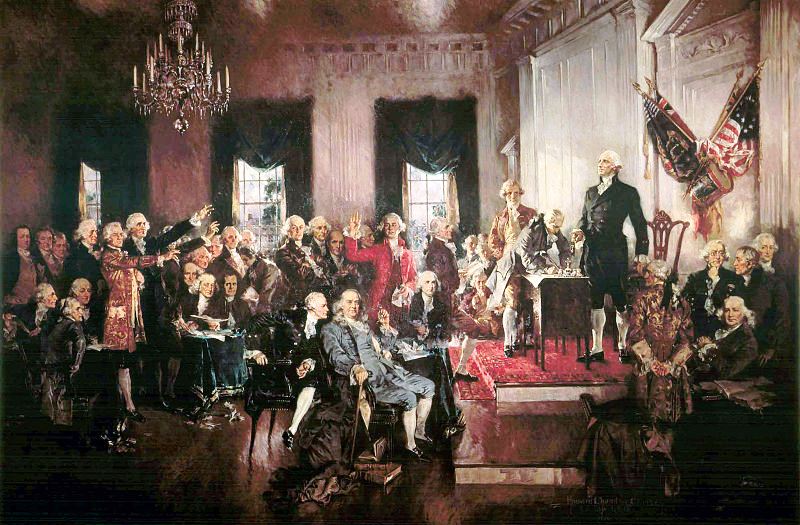This Week’s Dispatch From Hell In A Handbasket
Some of our problems are massive and even intractable, but the astonishing thing about America in the 21st Century is that we can’t solve even the little problems.

We’re Going to Hell in a Handbasket, Part 167,243
Your Humble Scrivener, fascinated since boyhood with the majestic possibilities and arcane workings of self-government, and desirous of sharing the glorious experience of self-determination with his fellow humans, now finds himself like Prometheus, chained to a rock while the vultures of greed, mendacity and incompetence feast upon the democratic spirit and institutions that he thought were his greatest birthright as an American.
There is no question, Dear Reader, but that Democracy, American Style is all but in the crapper. The causes of this decline, and the steps necessary to reverse the nosedive, are beyond the scope of this particular narrative, but I have placed my faith in what I like to call the Three Steps for Renewing American Democracy™:
1. PAY ATTENTION
2. GET OFF YOUR ASS
3. REGISTER AND VOTE
Surely some of our problems are massive and even intractable, but the astonishing thing about America in the 21st Century is that we can’t solve even the little problems. The U.S. House of Representatives is a cruel joke on the American people, and the U.S. Senate has gone from being the self-identified “World’s Greatest Deliberative Body” to the “World’s Worst Collection of Senile Oligarchs and Self-Aggrandizing Poseurs” within my lifetime.
My beloved State of Texas has fared no better. Never a breeding ground of executive or parliamentary excellence, our statewide offices and Legislature have sunk to new lows. Our Governor is a vain and insecure hack whose entire policy playbook consists in punching down on marginalized people. Our Lieutenant Governor is an authoritarian bully who single-handedly decides the fate of every policy issue before the Senate. Our Attorney General wakes up at night, tortured by the possibility that, somehow, somewhere in Texas, a transgender child feels loved and supported as a human being. The state senators are feckless and disorganized, and the House members have no answer to the State’s persistent problems – rising crime rates, underfunded schools, millions without health insurance, unsustainable property tax increases.
My idealistic hope is that some of these problems would begin to work themselves out if more people paid attention and voted. It does not help, of course, that in both Texas and America, the Haves designed a set of voting laws that systematically deny the Have Nots equal access to and influence on elections.
May 7th Constitutional Amendments
Despite this mildly pessimistic view of the current state of our polity, I remain committed to sharing my views on some of the issues of the day, particularly in conjunction with imminent opportunities to affect the outcome of those issues through elections. Which brings us to the May 7thelection, at which Texans will vote on two constitutional amendments and, depending on your location within the Great State, various local propositions and city council or school board elections.


The Texas Constitution is a mess. Written in 1876, it is designed to tie the Legislature’s hands and force voter input on minor details of state government. Because of its rigidity, the document has already been amended over 500 times.
If the Texas Constitution is a mess, how Texans pay for their government is a certified dumpster fire. Texas state government relies heavily on sales taxes, and local bodies like schools, health districts, and counties rely almost exclusively on property taxes. (Cities collect a combination of sales and property taxes.) Texas famously does not have an income tax, which means funding government is like, say, riding a tricycle with the front wheel sawed off.
The biggest chunk of property taxes goes to your local school district which, on average, is about 55% of your tax bill. Property taxes also fund counties, community colleges, public hospitals, libraries, water districts, etc.
The two constitutional amendments on the May 7 ballot both address high property taxes, but apply only to school district taxes. The first amendment applies to 1) property owners 2) with a homestead exemption 3) who also claim an over 65 and/or disabled exemption. Under current law, school property taxes are supposed to be “frozen” for someone claiming the 65+ or disabled exemption. Due to the intricacies of calculating school tax rates, some property owners were nevertheless seeing increases in their “frozen” taxes from year to year. The amendment would lock in the actual dollar amount and guarantee it would not be increased so long as the person owned that property.
The second amendment increases the baseline homestead exemption from school property taxes from $25,000 to $40,000. This would lower the average Texan’s property tax bill by $176. This would cost school districts between $355 and $436 million over the next four years, which would be backfilled by the State.
Neither amendment addresses the structural problem, which is the State’s chronic over-reliance on local property taxes to fund public education. The Texas Constitution, in what passes for soaring rhetoric, provides:
Sec. 1. SUPPORT AND MAINTENANCE OF SYSTEM OF PUBLIC FREE SCHOOLS. A general diffusion of knowledge being essential to the preservation of the liberties and rights of the people, it shall be the duty of the Legislature of the State to establish and make suitable provision for the support and maintenance of an efficient system of public free schools.
The promise of that language has remained unfulfilled for nigh on 150 years now. And will remain unfulfilled, even if these provisions pass, as they should.
Austin’s Local Ballot Proposition
Austin also has a referendum on the May 7th ballot. In typical Austin fashion, it covers two issues: marijuana decriminalization and banning no-knock warrants. And although some on the progressive left or reactionary right will find both ideas, respectively, salubrious or malignant, the proposition does not allow a voter to split the proverbial baby.
Which may have been the intent all along. Polls show broad bipartisan support for decriminalizing marijuana possession and use, especially in misdemeanor amounts. In fact, the referendum would formalize what is already policy at the Austin Police Department and Travis County Attorney’s Office (which handles misdemeanors).
National polls also show bipartisan support for banning no-knock warrants, but with less enthusiasm. There is no specific polling for Texas on the issue. The City Council has already restricted the use of no-knock warrants, and only four were issued in the last 18 months. The proposition would ban the practice outright. Because there is more room for disagreement on the wisdom of a complete ban, merging the two ideas into one proposition seems to be a smart move.
My prediction: voter turnout will be very low, and all three propositions will pass by comfortable majorities. Early voting begins tomorrow, Monday, April 25. Election Day is May 7.
